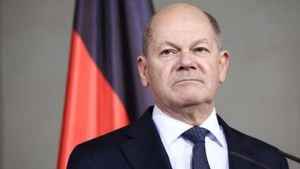BERLIN — The Christian Democratic Union (CDU) and its Bavarian sister party, the Christian Social Union (CSU), have emerged victorious from the German federal elections held on February 22, 2025. According to early exit polls by ZDF, the CDU-CSU coalition secured 28.5% of the votes, placing their leader, Friedrich Merz, in a prime position to succeed Olaf Scholz as the Chancellor of Germany. This marks a significant shift in the German political climate, as the far-right Alternative for Germany (AfD) won approximately 20% of the vote, showing remarkable growth amid troubling socio-economic conditions.
The Social Democratic Party (SPD), led by outgoing Chancellor Scholz, trailed behind with just 16.5%. Scholz acknowledged the harsh reality of the results, admitting to the bitter disappointment and taking full responsibility for the losses endured by his party. He remarked, "It is a bitter election result for the Social Democratic Party. It is also an election defeat, and I think... this time the election result is bad and ... I also have responsibility for this election result,” during his concession speech at SPD headquarters.
The CDU's social media platforms expressed gratitude for the support received from voters, declaring, "Thank you for your trust, thank you for your support! Voters in Germany have gien us a clear job: to take responsibility for your country and lead the next federal government,” reflecting the party's commitment to address the pressing issues facing the nation with "humility, determination and drive."
The electoral process utilized by Germany involves casting two votes: one for individual candidates representing their local constituencies and another for party lists, which influence the proportional makeup of the Bundestag. Understanding this process is key to recognizing how coalition governments are formed, especially since it's becoming increasingly common for no single party to gain outright majority support.
Now more than ever, the potential of minor parties playing major roles as coalition kingmakers is something to watch closely. The AfD achieved its best performance ever, doubling its support compared to the last election, and positioning itself to be part of the next government. Alice Weidel, the AfD leader, proudly declared, "I declare the AfD's campaign a glorious success," celebrating their historic gains. The AfD’s rise is particularly notable among younger voters, accentuated by their outreach via social media platforms like TikTok.
History looms heavily on the hearts of many Germans when considering the AfD's momentum. Under scrutiny and surveillance for suspected extremism, the party has polarized opinions, with political leaders from other parties affirming their commitment to uphold the traditional "firewall" which discourages cooperation with far-right factions. Merz himself has stated intentions to avoid coalitions with the AfD, indicating complicated future negotiations.
The German political scene faces immense challenges, with the sluggish economy being one of the focal points affecting voter sentiment. The SPD's previous coalition government failed due to substantial disagreements on fiscal and budgetary policies, emphasizing the importance for the new ruling coalition to navigate these delicate economic landscapes effectively. Efforts will likely include discussions about tax cuts, public expenditures, and reforms aimed at addressing Germany's once-stalwart industrial performance, which has faltered over recent years.
Alongside this, Germany grapples with rising tensions over immigration, particularly after various violent incidents allegedly linked to refugees and asylum seekers. This has created fertile ground for the AfD's anti-immigrant rhetoric and positions. Scholz's SPD will have to strategize how to reclaim lost voter trust and navigate these contentious discussions moving forward, especially as public outcry over immigration policies remains significant.
Adding to the complexity, the geopolitical climate also shapes local sentiments. With the backdrop of the Ukraine conflict and relations with Russia under tension, the new government will face pressures on how to respond, especially with divisions surfacing within the parties on whether or not to continue support for Ukraine.
Although the CDU-CSU has emerged strongly from the elections, forming the next coalition government will inevitably come with its own challenges. Political observers speculate it could take weeks or even months to finalize the governing coalition agreement, during which time political maneuvering and negotiations will be closely watched by constituents who are eager for decisiveness and tangible action on pressing national issues.
Overall, the 2025 German federal elections were not merely about securing votes; they reflect society's broader concerns, political aspirations, and the ever-changing dynamics within Europe's largest economy. Now, as the dust begins to settle, all eyes will be on Friedrich Merz and his ability to lead effectively through these convoluted times.



